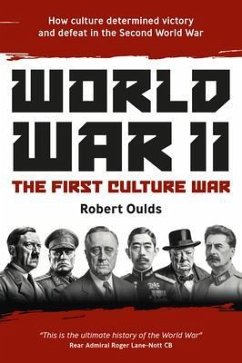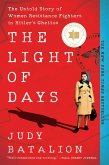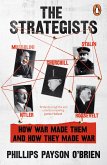The global conflict of WWII, the bloodiest yet in human history, was as much a clash of cultures as it was a clash of arms. Different world visions collided as fiercely as the great armies which encountered each other on the battlefields of Europe, Asia, and Africa. The struggle of ideas was as vicious as the battle on, and below the waves as was the fight in the skies above. Indeed, the culture war and national differences drove the conflict and influenced where, when, why, and even how, the war was fought.
Churchill, Stalin, and Roosevelt - as well as their opponents; Hitler, Mussolini, and Hirohito - shaped events. However, these intractable enemies were governed by the hand which history gave them, the political directed the personal, as they wrangled for control of the future.
Despite the initial successes of Nazi Germany and Japan, Hitler and his Axis were eventually outgunned and outthought.
How much can we consider that German and Japanese capitulation was inevitable? And what drove so few men to command so many - and devastate so much? Economic and cultural factors, as well as military power, determined victory for some and subjected others to defeat and utter ruin.
In many regards, Second World War throws up more questions than answers, but World War II: The First Culture War addresses certain controversial and unpalatable issues.
The war fighting skills and the ability to manufacture the weapons that were so effectively wielded by the Allies were begotten by the notions of individual freedom, limited government, and property rights. Those concepts emerged in one place only, mediaeval England. The culture that produced Anglo-Saxon exceptionalism, and colonialism, gave Britain and her Allies the advantage over the Nazis.
Initiative, imagination, industriousness, innovation, ingenuity, and inventiveness; encouraged by the powerful inducement that is a lust for private profit - though now unpopular in some circles - proved to be the basis for the superior social, economic, political, and military system which confronted the Axis.
For some time, Great Britain and its Empire stood alone against the might and menace of the Axis powers. Churchill, embodying a culture of defiance, believed that the English-speaking peoples would ultimately triumph. He was right. World War II: The First Culture War asserts why he was right and how this great victory was fought.
Churchill, Stalin, and Roosevelt - as well as their opponents; Hitler, Mussolini, and Hirohito - shaped events. However, these intractable enemies were governed by the hand which history gave them, the political directed the personal, as they wrangled for control of the future.
Despite the initial successes of Nazi Germany and Japan, Hitler and his Axis were eventually outgunned and outthought.
How much can we consider that German and Japanese capitulation was inevitable? And what drove so few men to command so many - and devastate so much? Economic and cultural factors, as well as military power, determined victory for some and subjected others to defeat and utter ruin.
In many regards, Second World War throws up more questions than answers, but World War II: The First Culture War addresses certain controversial and unpalatable issues.
The war fighting skills and the ability to manufacture the weapons that were so effectively wielded by the Allies were begotten by the notions of individual freedom, limited government, and property rights. Those concepts emerged in one place only, mediaeval England. The culture that produced Anglo-Saxon exceptionalism, and colonialism, gave Britain and her Allies the advantage over the Nazis.
Initiative, imagination, industriousness, innovation, ingenuity, and inventiveness; encouraged by the powerful inducement that is a lust for private profit - though now unpopular in some circles - proved to be the basis for the superior social, economic, political, and military system which confronted the Axis.
For some time, Great Britain and its Empire stood alone against the might and menace of the Axis powers. Churchill, embodying a culture of defiance, believed that the English-speaking peoples would ultimately triumph. He was right. World War II: The First Culture War asserts why he was right and how this great victory was fought.
Dieser Download kann aus rechtlichen Gründen nur mit Rechnungsadresse in A, D ausgeliefert werden.









